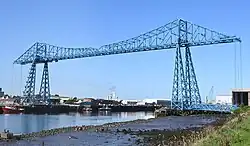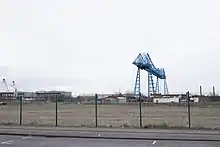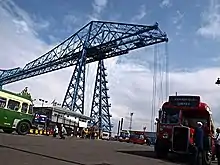Tees Transporter Bridge
The Tees Transporter Bridge, also referred to as the Middlesbrough Transporter Bridge or locally as The Transporter, is a bridge over the River Tees in northern England. The northern side is in Port Clarence (County Durham) and the southern side is in the Middlehaven (North Yorkshire), the latter an area of Middlesbrough. It is grade II* listed and the longest existing transporter in the world.[2] and its winch house and piers are grade II listed.[3][4]
Tees Transporter Bridge | |
|---|---|
 The bridge seen from the north bank | |
| Coordinates | 54.5845°N 1.2279°W |
| Carries | Motor vehicles A178 road Pedestrians |
| Crosses | River Tees |
| Locale | Middlesbrough and Port Clarence, England |
| Official name | Tees Transporter Bridge |
| Owner | Stockton-on-Tees Borough Council & Middlesbrough Council |
| Maintained by | Middlesbrough Council |
| Website | www |
| Preceded by | Tees Newport Bridge |
| Followed by | North Sea |
| Characteristics | |
| Design | Transporter Bridge |
| Material | Steel, concrete |
| Total length | 850 ft (260 m)[1] |
| Longest span | 570 ft (170 m)[1] |
| Clearance below | 160 ft (49 m)[1] |
| History | |
| Designer | Cleveland Bridge and Engineering Company |
| Contracted lead designer | CG Imbault |
| Constructed by | Sir William Arrol & Co. |
| Opened | 17 October 1911 |
| Statistics | |
| Toll | Vehicles (<3 tons): £1.50 (1 bay) Pedestrians and Cyclists: 70p |
Listed Building – Grade II* | |
| Official name | Transporter Bridge |
| Designated | 21 June 1985 |
| Reference no. | 1139267 |
| Location | |
It is the furthest downstream bridge crossing over the river. It is classed as the A178 road, the road between Middlesbrough and Hartlepool. As of 2022 the bridge is not operational. When working, it carries a travelling 'car', or 'gondola', suspended below the fixed structure, across the river in 90 seconds. The gondola can carry 200 people, 9 cars, or 6 cars and one minibus.
History
The idea of a transporter bridge across the River Tees was first mooted in 1872 when Charles Smith, Manager of the Hartlepool Iron Works, submitted a scheme to Middlesbrough Corporation. However, the scheme was not pursued, and it would not be until the new century that the idea of a transporter bridge across the river would again be revisited. Following a 1907 Act of Parliament the Bridge was built at a cost of £68,026 6s 8d (equivalent to £7,660,000 in 2021 values),[5] by Sir William Arrol & Co. of Glasgow between 1910 and 1911 to replace the 'Hugh Bell' and 'Erimus' steam ferry services.[6] A transporter bridge was chosen because Parliament ruled that the new scheme of crossing the river had to avoid affecting the river navigation.
.jpg.webp)

Construction work started in July 1909 with caissons being used to allow workers to dig down to bedrock.[7] This turned out to be 65 feet (20 m) below the high tide mark on the Middlesbrough side and 90 feet (27 m) on the other.[7] The shafts that had been dug out by this process were then filled with concrete.[8] The formal laying of the foundation stones, made of Aberdeen granite, took place in August 1910 when they were laid by Mayor of Middlesbrough Thomas Gibson-Poole and Alderman Joseph McLauchlan, the initiator of the transporter bridge scheme.[8] The opening ceremony on 17 October 1911 was performed by Prince Arthur of Connaught.[9] At its opening the bridge was painted red.[10]
During the First World War Middlesbrough was bombed by an L11 Zeppelin in April 1916.[11] During this raid it was reported that a bomb fell through the structure before hitting the river below.[11] During the Second World War the superstructure of the bridge was hit by a bomb. In 1953, the gondola got stuck half-way. While it was stuck, gale force winds lashed water to within inches of it; despite this the bridge continued to operate.
In 1961 the bridge was painted blue.[10]
In 1974, the comedy actor Terry Scott, travelling between his hotel in Middlesbrough and a performance at the Billingham Forum, mistook the bridge for a regular toll crossing and drove his Jaguar off the end of the roadway, landing in the safety netting beneath.[12]
In December 1993, the bridge was awarded the Institution of Mechanical Engineers' highest honour, The Heritage Plaque, for engineering excellence, in recognition of the Council's efforts in keeping the bridge in good working order. Its historical importance was also recognised in 1985 by its listing as a Grade II* Listed Building and its prominence as a local landmark was further enhanced in 1993 by the installation of floodlights that operate during the winter months.
In July 2000 a visitor centre was opened on land previously occupied by the bridge workshop.[13]
In 2011 the Tees Transporter Bridge received a £2.6 million Heritage Lottery Fund award for improvement and renovation work to mark the Bridge's centenary. The improvement works include the installation of a glass viewing lift to the landmark's upper walkway and renovation of the gondola.
The bridge was closed on 27 August 2013 for 40 days repainting. It was then discovered that repairs were needed. In the same year, the Tees Transporter Bridge Anniversary Award was inaugurated as part of the Transporter Bridge's Heritage Lottery Fund-supported Visitor Experience Project in partnership with the Chartered Institution of Highways & Transportation (CIHT) and Teesside University. The inaugural award winner was Stephen Brown in autumn 2013, with Jason Dunnett receiving the accolade in autumn 2014.[14]

On 5 March 2015, the Royal Mail issued a set of 10 First Class postage stamps featuring iconic British bridges including the Tees Transporter Bridge. The bridge was re-opened for traffic on 6 April 2015, but improvement work continued with the bridge still in daily use. These were completed in September 2015 after more than £4 million had been spent on the structure.[15][16]
In August 2019, the bridge was temporarily closed due to safety concerns.[17]
It is thought that repairs could cost up to £7 million and as of 2023 it remains closed with its future under discussion.[18][19][20]
Local culture

Locally, the bridge is often referred to simply as 'the Transporter'. The bridge hosts an annual vintage bus running day, organised by The 500 Group.[21] On this one day per year, usually a Sunday in April, vintage buses take people on free rides around Teesside. As part of the 2006 and 2007 events, the bridge made a special trip carrying a former Teesside Municipal Transport Daimler Fleetline, the first time a double-decker bus had used the bridge in 30 years.[22]
It has been featured in films and TV programmes including Boys from the Blackstuff, Billy Elliot, The Fast Show, Spender, Vera, and Steel River Blues. In the millennium celebrations of 2000, fireworks were fired from its length. The storyline of the third series of Auf Wiedersehen, Pet, saw the bridge dismantled to be sold to and re-erected in the US. The local council received calls from people worried that the bridge was really being pulled down,[23] with the BBC adding a disclaimer on the end of the final episode of the series stating that 'The Transporter Bridge is still in Middlesbrough'.
See also
- Newport Transporter Bridge – a similar bridge in South East Wales;
- Tees Newport Bridge – a vertical-lift bridge upstream of Middlesbrough.
- Warrington Transporter Bridge – a similar bridge in North West England, now disused.
References
- Dowson, A. G. (1986). A History of the Middlesbrough Transporter Bridge. Middlesbrough: Middlesbrough Borough Council Recreation and Amenities Department.
- Historic England. "Transporter bridge (1139267)". National Heritage List for England. Retrieved 11 May 2022.
- Historic England. "Winch House, Adjoining Railings, Wall, Gates and Gatepiers, C.40M South West of Transporter Bridge (1139847)". National Heritage List for England. Retrieved 18 October 2014.
- Historic England. "Piers, Railings and Gates at Entrance to Transporter Bridge (1139846)". National Heritage List for England. Retrieved 18 October 2014.
- UK Retail Price Index inflation figures are based on data from Clark, Gregory (2017). "The Annual RPI and Average Earnings for Britain, 1209 to Present (New Series)". MeasuringWorth. Retrieved 11 June 2022.
- Howes, Brian (May 2009). "Building the Past – Middlesbrough Transport Bridge". Best of British: 73. ISSN 1355-6681.
- Allan, Dave (2011). The Transporter 100 Years of the Tees Transporter Bridge. Middlesbrough Council. pp. 48–49. ISBN 0860830896.
- Allan, Dave (2011). The Transporter 100 Years of the Tees Transporter Bridge. Middlesbrough Council. p. 50. ISBN 0860830896.
- Allan, Dave (2011). The Transporter 100 Years of the Tees Transporter Bridge. Middlesbrough Council. p. 3. ISBN 0860830896.
- Allan, Dave (2011). The Transporter 100 Years of the Tees Transporter Bridge. Middlesbrough Council. p. 103. ISBN 0860830896.
- Allan, Dave (2011). The Transporter 100 Years of the Tees Transporter Bridge. Middlesbrough Council. p. 120. ISBN 0860830896.
- "Transporter Bridge celebrations end with time capsule". BBC News (Tees) Website. bbc.co.uk. 15 October 2012. Retrieved 22 June 2017.
- Allan, Dave (2011). The Transporter 100 Years of the Tees Transporter Bridge. Middlesbrough Council. p. 111. ISBN 0860830896.
- "Student receives inaugural Transporter anniversary award". Teesside University. 2017. Retrieved 28 January 2017.
- "Tees Transporter Bridge reopens". BBC News. 9 March 2015. Retrieved 15 October 2018.
- "Engineering Timelines – Middlesbrough Transporter Bridge". www.engineering-timelines.com. Retrieved 15 October 2018.
- "Tees Transporter Bridge". www.middlesbrough.gov.uk. 19 May 2016. Retrieved 24 February 2021.
- "Future of the Transporter Bridge to be discussed". www.middlesbrough.gov.uk. 9 December 2020. Retrieved 14 April 2022.
- Metcalfe, Alex (10 December 2020). "'It's not a relic': Leaders agree Transporter Bridge should reopen". TeessideLive. Retrieved 14 April 2022.
- "Historic Transporter Bridge structural problems 'much worse than advised'". The Northern Echo. Retrieved 8 August 2022.
- The 500 Group Archived 3 April 2007 at the Wayback Machine
- "Our annual Teesside Running Day". 27 April 2007. Archived from the original on 24 January 2008. Retrieved 19 January 2008.
- "Bridge not under threat, pet". BBC News. BBC. 13 May 2002. Retrieved 20 January 2009.
- Anon. (1911) "The transporter bridge over the River Tees", The Engineer, 112 (September)
- Fernández Troyano, Leonardo (2003) Bridge engineering : a global perspective [Tierra sobre el agua], London : Thomas Telford, ISBN 0-7277-3215-3
- Prade, Marcel (1988) Ponts et viaducs au XIXe siècle, Poitiers (France) : Brissaud, ISBN 2-902170-59-9
- Prade, Marcel (1990) Les grands ponts du monde: Ponts remarquables d'Europe, Poitiers (France) : Brissaud, ISBN 2-902170-65-3
- Woodhouse, Robert (2009) Tees Valley Curiosities, Stroud, Gloucestershire : The History Press, ISBN 978-0-7509-5077-0